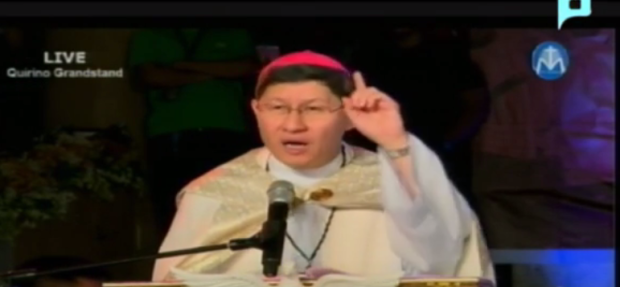Love—don’t judge—others, Tagle says on Feast of Black Nazarene

Manila Archbishop Luis Antonio Cardinal Tagle delivers his homily during the midnight mass for the Feast of the Black Nazarene. SCREENGRAB FROM PTV’S YOUTUBE VIDEO
To genuinely unite a divided country, one must to learn to love truly – by not being judgmental of others, and by doing good to your fellow man even without being in the limelight.
Manila Archbishop Luis Antonio Cardinal Tagle had this message to the devotees of the Black Nazarene during the Midnight Mass on Monday at the Quirino Grandstand in Luneta.
“This is one aspect of love that we need to be united. Divisivenesss is a fruit of prejudice. ‘They’re wrong, I’m right. You’re dirty, I’m clean. We’re different,’” he told the sea of devotees, mostly clothed in maroon.
Tagle delivered the homily in the Midnight Mass hours before the much-awaited Traslacion, with Fr. Hernando Coronel, parish priest of the Quiapo Church, presiding over the Mass.
READ: Nazareno ‘Traslacion’ leaves Quirino Grandstand
Article continues after this advertisementSeen hearing Mass were Manila Mayor Joseph Estrada, who was the hermano mayor of the Feast of the Black Nazarene; his wife Loi and daughter Jackie; former vice president Noli de Castro, a known devotee of the Black Nazarene; and Metropolitan Manila Development Authority chairperson Thomas Orbos.
Article continues after this advertisementTagle’s reminder came as Filipinos have become more divided, particularly the supporters of President Rodrigo Duterte and his critics.
His message was centered on the theme for this year’s Traslacion, “Pag-ibig ang buklod ng ganap na pagkakaisa.”
In his 17-minute homily, the prelate urged Filipinos to emulate the two characteristics of love that Jesus Christ Himself lived.
This is by treating one’s fellow man as no different from one’s self, and by doing good to your neighbor without seeking fame or praise.
In treating one’s neighbor as no different, one must refrain from the bad habit of judging others.
“’Your mind is crooked, I have a clear mind. We’re different.’ And if that continues, we will not attain unity because we don’t have the ability to say, ‘we are not different from one another,’” Tagle said.
BACKSTORY: Look up to God in humility, Tagle tells Nazarene devotees
Jesus the Nazarene is the inspiration for the miraculous image of the Black Nazarene, which continues to attract millions of devotees in an hours-long procession, the Traslacion.
The archbishop referred to the Filipino expression, “Huwag mo nang ituring na iba ka sa amin, hindi ka iba,” which means that one is practically part of the family.
Tagle reminded Filipinos not to be so quick to pass judgment on others, especially if they themselves sometimes are tempted to sin.
“If someone is tempted, let us not judge him as if we are sinless. We tend to separate ourselves instead of remembering that we too are tempted. If he is tempted to sin, we should unite and help one another to fight temptation,” he stressed.
In jest, Tagle added that Filipinos should not be so quick to anger at forgetful relatives and friends who do not remember their names, since all people also tend to forget things at times.
“This is a love that says, we are together, we are no different from each other… This is a love that is ready to embrace even the sinners and those who are weak, instead of trampling on them and separating ourselves from them,” he said.
Tagle noted that the sinless Jesus Christ himself, during his baptism by John the Baptist, did not shy away from being with sinners asking to be baptized.
“He was not ashamed to be seen with the lowly, the persecuted for being sinners. He made them feel that they are not different from Him, He was there to be one with them,” he added.
Another aspect of love as taught by Jesus the Nazarene, Tagle said, is how Jesus Christ performed good works and miracles for others without seeking fame or praise.
“He did all of it not to get attention or praise. He did it calmly, without raising His voice… and to see justice done. Love that serves because one thinks of what is good for his fellow man,” the prelate said.
Love is patient and does not delight in destroying other people, Tagle said, adding that it always thinks of the good of others by considering them as no different from one’s self.
“This is the love that would foster unity in families, parishes, barangays, our nation and the whole world,” he ended./rga